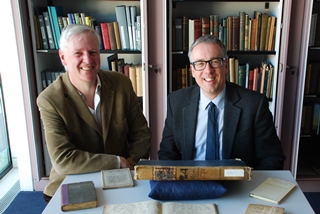Marking Reading's role in the Irish Rising, 100 years on
Release Date 04 May 2016

A century after the Easter Rising, a new exhibition is marking the little-known but key role that Reading played in Ireland's struggle for independence.
The exhibition, ‘Universities of Revolution', which runs at the Berkshire Record Office, highlights how Reading Gaol became the prison - but also the training ground - for some of the leading members of the Irish Independence movement, following the Easter Rising in 1916.
Among those held without trial at Reading were some of the key political leaders of the later Irish Republic. These included the founder of Sinn Féin, Arthur Griffith, who would become first President of the Dail; his successor in that role, William Thomas Cosgrave; the poet, playwright and campaigner Terence MacSwiney; and the novelist and poet Darrell Figgis.
The exhibition is a collaboration between Mark Stevens, the County Archivist, and Professor Steven Matthews, Professor of English Literature at the University of Reading.
Mark Stevens said: "While the story of the Easter Rising is well known, Berkshire's place in it is not. We hope this exhibition goes some way to addressing that, and shows how 45 Irishmen were schooled in Reading to become leaders of their own, independent country."
'The Reading prisoners developed a collective Irish identity, language and culture that has been present in Irish literature ever since' -- Professor Steven Matthews
Professor Matthews said: "Reading was made infamous in literature by Oscar Wilde through his ‘Ballad of Reading Gaol' in the 1890s. Yet it was in incarcerating this later generation of Irish leaders, writers and poets that Reading played a more critical role in Irish politics and literature.
"Not only was Reading one of the ‘Universities of the Revolution', schooling its internees in the tactics of independence, but the prisoners developed a collective Irish identity, language and culture that has been present in Irish literature ever since."
Cllr Paul Gittings, Reading Borough Council's Lead Member for Culture, said: "I would urge people to visit this fascinating exhibition for a rare glimpse into the prison's history and its impact on the key figures in the drive for Irish freedom."
The exhibition in Coley Avenue, Reading, includes original prison documents, records and plans from the jail in 1916. It also shows important literary artefacts relating to the work of Figgis and MacSwiney.
The exhibition is free, and open during the Berkshire Record Office opening hours. It runs until 29 July. More details from 0118 937 5132.
